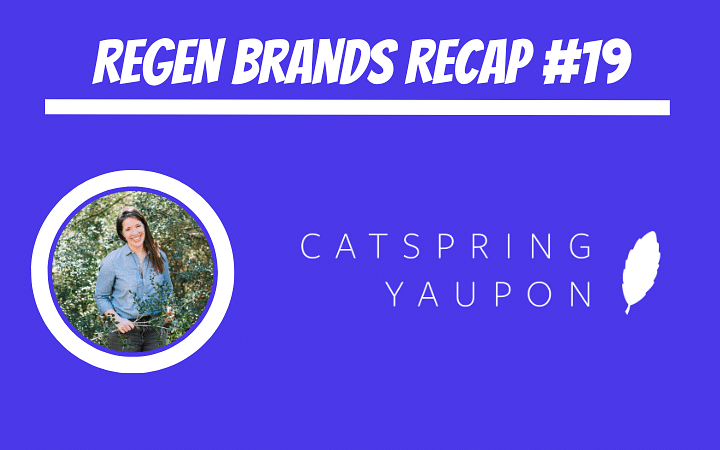
Abianne Falla @ Catspring Yaupon
A Native Caffeine Resurgence
Catspring Yaupon is supporting regenerative agriculture with its loose-leaf and bagged Yaupon teas and its new VIBE Yaupon crystals. Founded by Abianne Falla, Catspring Yaupon is not only building a brand, but forging a completely new consumer category by reintroducing Yaupon to the American consumer.
The Brand
Catspring sells bagged and loose-leaf Yaupon “tea” in three flavors (green, medium and dark roast). They also recently introduced VIBE (also 100% Yaupon) using clean technology to create a crystal-based concentrate that is instantly soluble in hot or cold water.
Yaupon is the only naturally caffeinated plant native to North America. It contains about 25 mg of caffeine per serving, plus theobromine and theacrine, for a longer, sustained release and more mental clarity than coffee, tea or other synthetic caffeinated beverages. Despite being labeled for decades by the USDA as a poisonous, invasive species, Yaupon has proven to be a sustainable alternative and nutritious ingredient within the caffeinated beverage category.
Catspring Yaupon is available online on their site and Amazon, and sold at Whole Foods and Central Market in the Southwest. They also supply as a bulk ingredient to kombucha brewers like Greenbelt in Texas and smaller brewers across the U.S., as well as tea companies like Harney & Sons and energy drinks like Rambler. Catspring has also been successful selling direct to restaurants, hotels and spas.
Whole Foods has named Yaupon the top food trend for 2023, and Forbes has lauded 2023 as "The Year of Yaupon Tea."
Yaupon chatting with its counterparts in the tea / coffee aisle ⬇️
Their “Why”
In 2011, a historical drought wiped out everything from hay to 100-year oak trees on Abianne’s family ranch in Cat Spring, Texas. Yet the Yaupon, often considered an invasive species, was thriving. After digging into its history, Abianne learned that Yaupon was not only native to Texas, the Gulf Coast and Outer Banks, but it had a rich history with native indigenous tribes. In addition to being the only caffeinated plant in North America, Yaupon is a natural cleanser and very anti-inflammatory with antioxidants comparable to blueberries. From a sustainability perspective, it’s also incredibly resilient, tenacious and regenerative, offering a unique connection to place.
While exploring the market potential of Yaupon, Abianne realized the tea industry has plenty of “dirty laundry”. Other than a few single-origin tea farms practicing great agriculture, most tea is sourced from far-away foreign markets with little regulatory oversight or transparency around how the tea is grown. Because distributors are often so removed from how the product is grown, even the organic certification has massive exposure to drift, with up to 50% of organic teas showing trace amounts of herbicides and pesticides. And because tea leaves are never washed, the first time they are processed is when they are steeped – supercharging any bioavailable pesticides or herbicides.
A Uniquely Regenerative Model
Yaupon’s unique characteristics lend itself to a more sustainable model. This understory, dense shrub-like tree can grow 20 to 30 feet high. When it’s stressed, Yaupon rhizomes spread horizontally underground, shooting out lateral shoots that branch out even after the tree is cut down.
Catspring sustainably wild harvests Yaupon from 1,100 privately-owned acres that are certified organic, regenerative organic, non-GMO and kosher – creating a sustainable and profitable way to manage Yaupon growth.
Abianne is also working with the USDA NRCS on a pilot to understand why the Yaupon grows so tenaciously. The theory is that as native grasses (with root systems ranging from three to 15 feet) were replaced by hay for cattle, Yaupon was able to grow unchecked. Together, Abianne and NRCS are exploring how to reintroduce native grasses alongside Yaupon to create a silvopasture-like situation where each plant can thrive and restore balance to the natural ecosystem in the process.
A citizen of the Chickasaw Nation and member of the Intertribal Agricultural Council, Abianne is proving the definition of a Chicksaw warrior as "a steward of the land."
“We're not fighting Mother Nature for a crop that shouldn't be here – this crop is fighting everything else to sustain itself. Why would we produce Yaupon in any other way (besides regenerative organic) when it is so deeply tied to so many different indigenous tribes? Regenerative organic is nothing new. It is what the indigenous people were forced to stop doing.” – Abianne
<svg width="50px" height="50px" viewbox="0 0 60 60" version="1.1" xmlns="https://www.w3.org/2000/svg" xmlns:xlink="https://www.w3.org/1999/xlink"><g stroke="none" stroke-width="1" fill="none" fill-rule="evenodd"><g transform="translate(-511.000000, -20.000000)" fill="#000000"><g><path d="M556.869,30.41 C554.814,30.41 553.148,32.076 553.148,34.131 C553.148,36.186 554.814,37.852 556.869,37.852 C558.924,37.852 560.59,36.186 560.59,34.131 C560.59,32.076 558.924,30.41 556.869,30.41 M541,60.657 C535.114,60.657 530.342,55.887 530.342,50 C530.342,44.114 535.114,39.342 541,39.342 C546.887,39.342 551.658,44.114 551.658,50 C551.658,55.887 546.887,60.657 541,60.657 M541,33.886 C532.1,33.886 524.886,41.1 524.886,50 C524.886,58.899 532.1,66.113 541,66.113 C549.9,66.113 557.115,58.899 557.115,50 C557.115,41.1 549.9,33.886 541,33.886 M565.378,62.101 C565.244,65.022 564.756,66.606 564.346,67.663 C563.803,69.06 563.154,70.057 562.106,71.106 C561.058,72.155 560.06,72.803 558.662,73.347 C557.607,73.757 556.021,74.244 553.102,74.378 C549.944,74.521 548.997,74.552 541,74.552 C533.003,74.552 532.056,74.521 528.898,74.378 C525.979,74.244 524.393,73.757 523.338,73.347 C521.94,72.803 520.942,72.155 519.894,71.106 C518.846,70.057 518.197,69.06 517.654,67.663 C517.244,66.606 516.755,65.022 516.623,62.101 C516.479,58.943 516.448,57.996 516.448,50 C516.448,42.003 516.479,41.056 516.623,37.899 C516.755,34.978 517.244,33.391 517.654,32.338 C518.197,30.938 518.846,29.942 519.894,28.894 C520.942,27.846 521.94,27.196 523.338,26.654 C524.393,26.244 525.979,25.756 528.898,25.623 C532.057,25.479 533.004,25.448 541,25.448 C548.997,25.448 549.943,25.479 553.102,25.623 C556.021,25.756 557.607,26.244 558.662,26.654 C560.06,27.196 561.058,27.846 562.106,28.894 C563.154,29.942 563.803,30.938 564.346,32.338 C564.756,33.391 565.244,34.978 565.378,37.899 C565.522,41.056 565.552,42.003 565.552,50 C565.552,57.996 565.522,58.943 565.378,62.101 M570.82,37.631 C570.674,34.438 570.167,32.258 569.425,30.349 C568.659,28.377 567.633,26.702 565.965,25.035 C564.297,23.368 562.623,22.342 560.652,21.575 C558.743,20.834 556.562,20.326 553.369,20.18 C550.169,20.033 549.148,20 541,20 C532.853,20 531.831,20.033 528.631,20.18 C525.438,20.326 523.257,20.834 521.349,21.575 C519.376,22.342 517.703,23.368 516.035,25.035 C514.368,26.702 513.342,28.377 512.574,30.349 C511.834,32.258 511.326,34.438 511.181,37.631 C511.035,40.831 511,41.851 511,50 C511,58.147 511.035,59.17 511.181,62.369 C511.326,65.562 511.834,67.743 512.574,69.651 C513.342,71.625 514.368,73.296 516.035,74.965 C517.703,76.634 519.376,77.658 521.349,78.425 C523.257,79.167 525.438,79.673 528.631,79.82 C531.831,79.965 532.853,80.001 541,80.001 C549.148,80.001 550.169,79.965 553.369,79.82 C556.562,79.673 558.743,79.167 560.652,78.425 C562.623,77.658 564.297,76.634 565.965,74.965 C567.633,73.296 568.659,71.625 569.425,69.651 C570.167,67.743 570.674,65.562 570.82,62.369 C570.966,59.17 571,58.147 571,50 C571,41.851 570.966,40.831 570.82,37.631"></path></g></g></g></svg>View this post on Instagram
Creative Funding
Like most regenerative brands, Catspring Yaupon has had to rely on creative funding. For them, it’s been all about tapping into grants from the USDA and Texas Department of Agriculture, and random funding like an Eileen Fisher Women-Owned Business Grant and money from the We Work Creator Awards. Abianne admits that navigating Department of Agriculture grants is really challenging (even for her, with an MBA and time spent as a CPA for Ernst & Young) – and she even hired someone to help them with their first application.
“We must channel the USDA funding that has historically gone to bigger companies instead to people who are using this money for good. The positive news is that the NRCS is now focused on dispatching more capital to regenerative, climate-smart practices, with an emphasis on previously marginalized communities – so I always recommend just going for it.” – Abianne
Our Path to 50% Market Share 4 ReGen
For Abianne, narrowing the price gap between regenerative and conventional food is key. She doesn’t expect anyone to pay 10 times the price for a regenerative product, so stakeholders need to come together all along the supply chain, solving problems together, and finding ways to make more regenerative and sustainable choices. There are tradeoffs that brands have to make to satisfy both their regenerative ideals and the demands of the current CPG landscape. Abianne advises a "progress over perfection" mentality that focuses on constant, consistent improvement that can be documented and celebrated.
“If you really care about the planet, there are choices you can make. You might have to pay a premium, but your choices can be better for the world and for your own health. At the same time, as an industry, we must be better at making sure those premiums aren't too high because regenerative ag should never be a luxury.” – Abianne
You can check out the full episode with Abianne from Catspring Yaupon HERE.
Subscribe to future episodes of the ReGen Brands Podcast on your favorite podcast platform using the buttons below. You can help support our mission of growing regenerative CPG brands with a 5-star rating!
Stay engaged in the conversation by subscribing to our weekly newsletter, The ReGen Brands Weekly, and connecting with us on LinkedIn (Kyle & AC).
Your support of the show and these brands truly means the world to us. Thank you!
This ReGen Recap was produced with support from Kristina Tober

